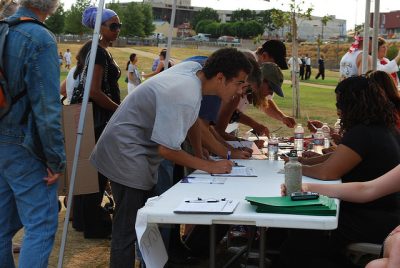Border Enforcement
Migration at the border is a multifaceted issue, challenging the U.S. to secure our borders while upholding the human rights of individuals seeking safety and better opportunities. Balancing national security with compassion and our legal obligations to asylum seekers presents intricate dilemmas, and we collaborate with policymakers to advance bipartisan, action-oriented solutions.
Beyond A Border Solution
- Asylum
- May 2, 2023
America needs durable solutions. These concrete measures can bring orderliness to our border and modernize our overwhelmed asylum system. Read…
Read More
How Immigrants on a Pathway to Citizenship can Revitalize Rust Belt Cities
Like Rust Belt cities such as Baltimore and Detroit, rural towns across America have experienced population declines in recent decades. Some places, however, are an exception to that trend thanks in part to the arrival of immigrants. For example, while other Iowa towns experienced population decline over the past several decades, West Liberty’s population grew because of immigration. As Steve Hanson, superintendent of West Liberty Community School District, notes, “in the last 20-30 years we would have had a population decline if we hadn’t had immigrants come in [for] jobs in the food manufacturing business. They provide a source of labor that wouldn’t have been there.” And West Liberty’s Mayor, Chad Thomas, said immigration has “kept a lot of storefronts and businesses open that probably otherwise would have closed.” Read More

Alabama’s HB 56 Anti-Immigrant Law Takes Final Gasps
Immigration advocates who have been fighting against Alabama’s HB 56, the punitive immigration measure often called the “show me your papers” law, declared victory after the state agreed not to pursue key provisions of the 2011 legislation. The agreement is part of a settlement of long-running lawsuits filed by the U.S. Department of Justice (DOJ) and a coalition of civil rights groups against HB 56. Alabama. The Supreme Court earlier this year refused to hear the state’s appeal of a previous federal court’s ruling that gutted the law. Read More

ICE Will Not Use Health Care Application Information for Immigration Enforcement Purposes
Last Friday U.S. Immigration and Customs Enforcement (ICE) issued a clarification stressing that information provided by those applying for insurance under the Affordable Care Act will not trigger immigration enforcement. Undocumented immigrants are not eligible for health care under the Affordable Care Act (ACA); however, this clarification should bring peace of mind to mixed-status families. Eligible members of those families will now be able to seek coverage under the ACA without fear of placing some family member at risk of deportation. Read More

Three Ways Congressional Inaction on Immigration is Hurting Children
Last week, First Focus released a new report, “The Cost of Inaction: Why Children Can’t Wait for Immigration Reform.” The report highlights the particularly vulnerable position children are placed in within our broken immigration system. Read More

Nativist Group Pretends That All Unauthorized Immigrants Are Criminals
Unauthorized immigrants come to this country primarily for two reasons: to work, and to be reunited with family members who are already here. They would obviously prefer to come to this country legally, but our legal limits on immigration have for decades not matched either the realities of U.S. labor demand or the natural human desire for family unity. And so they opt to make the expensive, difficult, and dangerous decision to come without authorization because that is what they judge to be the best chance they and their families have for a better future. In other words, the overwhelming majority of unauthorized immigrants are as far from being hardened criminals as you could possibly get. They are gardeners and housekeepers; husbands and wives; parents with children. They are members of U.S. society and integral to the U.S. economy. Read More

California Governor Signs Sweeping Immigration Reforms into Law
On the same day thousands of immigrant activists rallied across the country for immigration reform, California Gov. Jerry Brown signed several bills into law that put the state at the forefront of the efforts to fix immigration policies at the state and local level. Among the measures Brown approved was the TRUST Act, which limits who state and local police can hold for possible deportation. "While Washington waffles on immigration, California's forging ahead," Brown said in a statement. "I'm not waiting." Read More

ICE Detainers Continue to Target Immigrants with No Criminal Convictions
This week, the Transactional Records Access Clearinghouse (TRAC) released a troubling new report showing that only about 10% of ICE detainers target “individuals who pose a serious threat to public safety or national security.” Although the agency’s highest enforcement priorities are threats to public safety and national security, government data shows that, in recent months, the majority of detainers were issued for individuals who had no criminal convictions. Read More

House Democrats Introduce New Comprehensive Immigration Bill
Several Democrats in the House of Representatives proposed H.R. 15, an immigration reform bill today that addresses border security, legalization of undocumented immigrants, interior enforcement of the immigration laws, and fixes for our dysfunctional legal immigration programs. This bill is based on S.744, which the Senate passed in June, but removes the Corker-Hoeven border security amendment. Instead, the House Democrats’ bill replaces it with Rep. Michael McCaul’s (R-TX) bipartisan House border security bill, H.R. 1417, which the Homeland Security Committee passed unanimously in May. Read More

Colorado Emergency Relief Efforts Impeded by Immigrants’ Mistrust of Law Enforcement
The recent flooding in Colorado, in which eight people died and property losses are likely to reach $2 billion, offers another reminder that local law enforcement efforts are often hindered by our broken immigration system. The Denver Post reported that some unauthorized immigrants risk injury or miss out on assistance because they are afraid to interact with police. For example, Augustina Tema’s husband, who is an unauthorized immigrant, was afraid to come outside when police officers went door-to-door to warn residents of the pending flood. Augustina, a legal resident, expressed fear of applying for assistance because of her husband’s status, a fear other undocumented families echoed. For the undocumented families, the tragedy of losing their homes to flooding is compounded by the loss of their “paper trail”—materials that would be needed to prove residency for any future legalization programs. Disaster-related documentation problems extend to those legally residing in the United States if the papers that prove an immigrant may legally live and work in the United States are lost as well, further hindering emergency assistance. Read More

Customs and Border Protection’s New “Use of Force” Initiatives Are Welcome First Steps
The endemic use of force within U.S. Customs and Border Protection (CBP) made national headlines in 2010 when Anastacio Hernandez Rojas, a 42-year old Mexican national living in San Diego, was killed by a Border Patrol Officer while in CBP custody. Since then, at least 18 other people have have died as the result of alleged excessive use of force by CBP officials, including six U.S. citizens and seven minors under 21. These incidents prompted the Department of Homeland Security (DHS) to review the use of force at CBP. A report issued earlier this month by DHS’s Office of Inspector General (OIG) exposes the inadequacies of the “use of force training” for Border Patrol agents and a series of operational flaws in the agency’s monitoring of employee misconduct. Read More
Make a contribution
Make a direct impact on the lives of immigrants.

